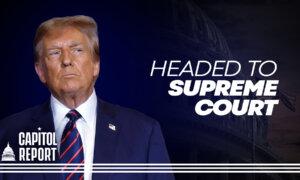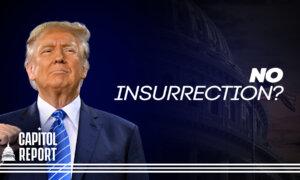The Supreme Court is hearing oral arguments on whether the Colorado Supreme Court erred in ruling that former President Donald Trump is disqualified as a candidate for the presidential primaries under Section 3 of the 14th Amendment.
Legal questions abound, and experts and stakeholders have urged the high court to address the issue comprehensively so as to not result in a surprise disqualification issue for any candidate that could arise all the way up to inauguration day.
The 14th Amendment was ratified in the wake of the Civil War, granting citizenship and equal rights to all persons born or naturalized in the United States. Section 3 was added to prevent deserters who joined the Confederacy from returning to the offices they abandoned, unless a two-thirds vote from Congress removed the disqualification.
The novel legal theory that President Trump engaged in “insurrection” as written in Section 3 began circulating a day after Jan. 6, 2021, with advocates urging state election officials to bar him from any future ballots. The House of Representatives voted to impeach President Trump a second time weeks later based on “incitement to insurrection,” but he was then acquitted in the Senate.
Last summer, the movement was revived when legal challenges to President Trump were filed in dozens of jurisdictions across the nation.
On Dec. 19, Colorado became the first state to officially declare President Trump ineligible for the ballot, in an unusual decision that stayed its own order in anticipation of a Supreme Court appeal. Soon after, the Maine secretary of state followed in issuing a decision to remove President Trump from the ballot, while staying the removal in the event of an appeal.
As of early January, attorneys for President Trump noted 60-plus cases in 30-some states that they were aware of. On Jan. 5, the Supreme Court accepted President Trump’s petition to review the Colorado decision, and several other courts have dismissed similar cases to defer to the high court’s impending decision.
Attorneys for President Trump argue that not only did he not engage in or incite an insurrection, but Section 3 does not apply to presidents at all.
An administrative note indicates the Supreme Court will issue a written opinion on Feb. 8, the same day as oral arguments.
Original News Source Link – Epoch Times
Running For Office? Conservative Campaign Consulting – Election Day Strategies!


